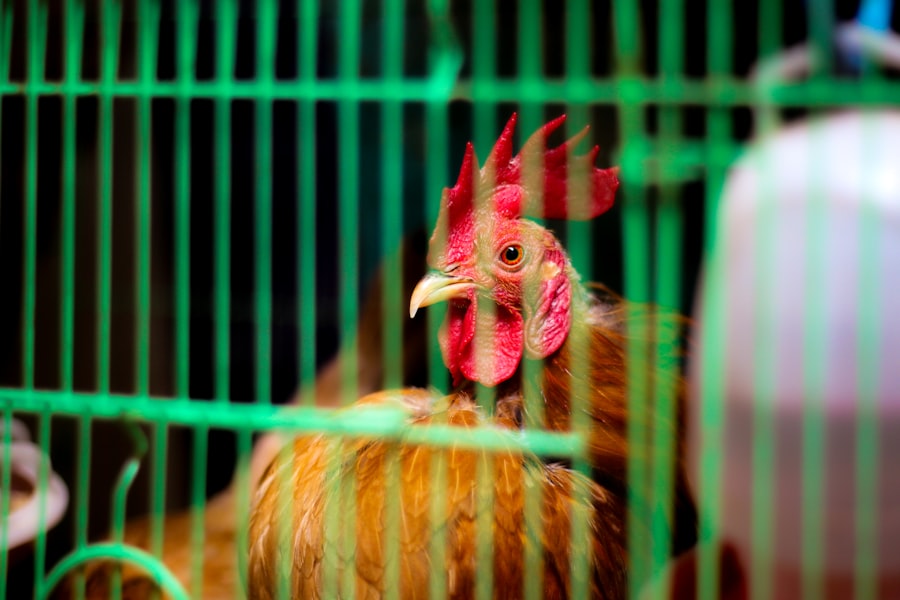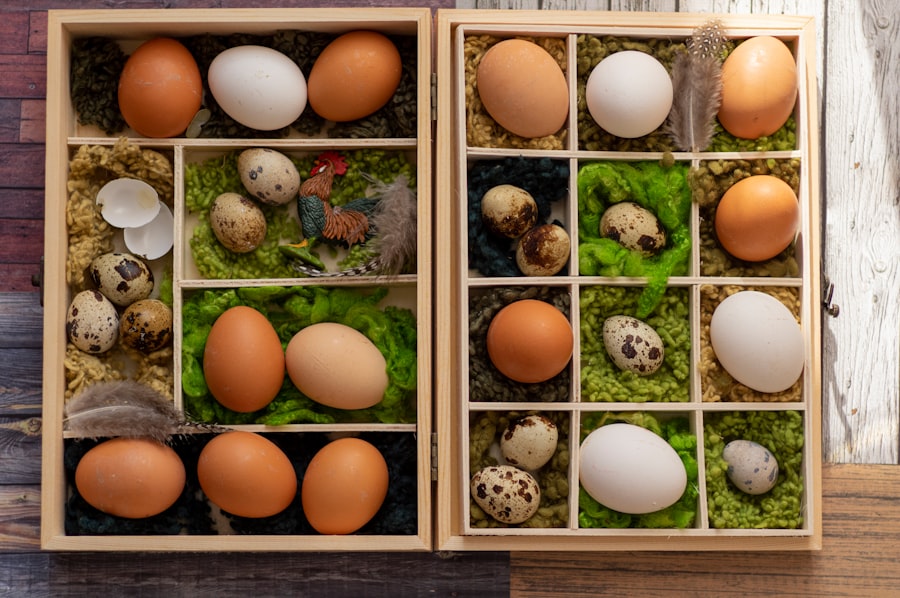When raising chickens, providing a spacious coop is crucial for their health and well-being. A roomy coop allows chickens to move freely, stretch their wings, and engage in natural behaviors like scratching and dust bathing. Adequate space also reduces stress and aggression within the flock, as overcrowding can lead to pecking and fighting.
Furthermore, a spacious coop ensures proper ventilation, which is essential for maintaining good air quality and preventing respiratory problems. To ensure chickens have sufficient space, it is recommended to provide at least 2-3 square feet of indoor coop space per chicken and 8-10 square feet of outdoor run space per bird. These guidelines allow chickens to move comfortably and exhibit natural behaviors.
Regular cleaning and maintenance of the coop are also important to prevent the accumulation of waste and bacteria, which can cause health issues for the chickens. By providing a spacious and well-maintained coop, chicken owners can promote the health, happiness, and overall well-being of their flock. This approach helps ensure that chickens thrive in their environment and remain productive members of the flock.
Table of Contents
- 1 Offering a Balanced Diet
- 2 Ensuring Clean Water
- 3 Providing Enrichment Activities
- 4 Regular Health Checks
- 5 Protecting from Predators
- 6 Allowing for Free Range Grazing
- 7 FAQs
- 7.1 What are the basic needs of chickens to keep them happy and healthy?
- 7.2 What should be included in a chicken’s diet to keep them healthy?
- 7.3 How much space do chickens need to stay healthy and happy?
- 7.4 What are some common health issues in chickens and how can they be prevented?
- 7.5 How can I keep my chickens safe from predators?
Key Takeaways
- Providing a spacious coop is essential for the well-being of your chickens, allowing them to move around freely and engage in natural behaviors.
- Offering a balanced diet is crucial for the health of your chickens, including a mix of grains, greens, and protein sources.
- Ensuring clean water is important to prevent diseases and dehydration in your chickens, so make sure to regularly clean and refill their water containers.
- Providing enrichment activities such as perches, dust baths, and toys can keep your chickens mentally and physically stimulated.
- Regular health checks are necessary to monitor the overall well-being of your chickens and catch any potential health issues early on.
Offering a Balanced Diet
Nutrient-Rich Ingredients
A balanced diet for chickens typically consists of a combination of grains, protein, vitamins, and minerals. Grains such as corn, wheat, and oats provide energy, while protein sources like soybean meal, fish meal, or mealworms help support muscle development and egg production.
Essential Vitamins and Minerals
Additionally, chickens require access to calcium for strong eggshells, which can be provided through sources such as crushed oyster shells or limestone. In addition to grains and protein, chickens also benefit from access to fresh fruits and vegetables, which provide essential vitamins and minerals.
A Diverse and Hydrating Diet
Offering a diverse range of foods not only ensures that chickens receive all the nutrients they need, but also helps to prevent boredom and encourage natural foraging behaviors. It’s important to provide access to clean, fresh water at all times, as dehydration can lead to a range of health issues for chickens. By offering a balanced diet that meets all of their nutritional needs, chicken owners can ensure that their flock remains healthy and productive.
Ensuring Clean Water

Clean water is essential for the health and well-being of chickens. Just like any other living creature, chickens require access to fresh, clean water in order to stay hydrated and maintain proper bodily functions. Water plays a crucial role in digestion, temperature regulation, and overall health for chickens.
Without an adequate supply of clean water, chickens can quickly become dehydrated, leading to a range of health issues such as reduced egg production, poor growth, and even death. In order to ensure that chickens have access to clean water at all times, it’s important to regularly clean and refill their water containers. This helps to prevent the buildup of bacteria and algae, which can contaminate the water and make it unsafe for consumption.
Additionally, water containers should be placed in a shaded area to prevent overheating and evaporation during hot weather. Providing access to clean water is a simple yet crucial aspect of caring for chickens, and it plays a significant role in maintaining their overall health and well-being.
Providing Enrichment Activities
Providing enrichment activities is an important aspect of caring for chickens. Enrichment activities help to keep chickens mentally stimulated and engaged, preventing boredom and stress. This can be particularly important for chickens that are kept in confined spaces or coops for extended periods of time.
Enrichment activities can include providing access to natural materials such as branches, logs, or straw bales for pecking and scratching. Additionally, hanging treats or toys such as cabbage heads or mirrors can provide entertainment and mental stimulation for chickens. Allowing chickens to free range in a safe outdoor area is another excellent way to provide enrichment.
Free ranging allows chickens to engage in natural behaviors such as foraging, dust bathing, and exploring their environment. This not only provides mental stimulation but also allows chickens to get exercise and fresh air, promoting overall health and well-being. By providing enrichment activities, chicken owners can ensure that their flock remains happy, healthy, and content.
Regular Health Checks
Regular health checks are essential for ensuring the well-being of chickens. Monitoring the health of chickens allows owners to identify any potential issues early on and take appropriate action to prevent further complications. Regular health checks should include observing the flock for any signs of illness or injury, such as lethargy, abnormal droppings, or changes in behavior.
Additionally, it’s important to regularly inspect chickens for external parasites such as mites or lice, which can cause discomfort and lead to health issues if left untreated. In addition to visual checks, regular health checks should also include monitoring egg production and quality. Changes in egg production or the appearance of eggs can be an indicator of underlying health issues in the flock.
It’s also important to maintain accurate records of vaccinations and deworming schedules to ensure that chickens receive necessary preventative care. By conducting regular health checks and staying vigilant for any signs of illness or injury, chicken owners can help ensure that their flock remains healthy and thriving.
Protecting from Predators

Securing the Coop
To protect chickens from predators, it’s important to secure their coop with sturdy fencing and locks to prevent unauthorized entry. Coop windows should be covered with predator-proof wire mesh to prevent access from climbing predators such as raccoons or snakes.
Free Ranging Safely
When allowing chickens to free range, it’s important to supervise them closely and provide secure shelter in the form of a predator-proof run or coop that they can access at all times. This helps to protect them from aerial predators such as hawks or owls.
Deterrents and Proactive Measures
Additionally, using deterrents such as motion-activated lights or sound devices can help deter predators from approaching the chicken coop or run. By taking proactive measures to protect chickens from predators, owners can help ensure that their flock remains safe and secure.
Allowing for Free Range Grazing
Allowing chickens to free range graze is beneficial for their overall health and well-being. Free ranging allows chickens to engage in natural behaviors such as foraging for insects and plants, dust bathing, and exploring their environment. This not only provides mental stimulation but also allows chickens to get exercise and fresh air, promoting overall health and well-being.
Additionally, free ranging can help reduce stress and aggression among the flock by providing ample space for chickens to move around freely. When allowing chickens to free range graze, it’s important to provide a safe outdoor area that is protected from predators and other potential hazards. This can be achieved by using secure fencing or netting around the free range area and providing access to shelter in the form of a predator-proof coop or run.
Additionally, it’s important to supervise free ranging chickens closely to ensure their safety and intervene if necessary. By allowing for free range grazing, chicken owners can provide their flock with a natural and enriching environment that promotes overall health and well-being. In conclusion, caring for chickens requires attention to various aspects of their physical and mental well-being.
Providing a spacious coop with adequate ventilation is crucial for maintaining good air quality and preventing respiratory issues among the flock. Offering a balanced diet that meets all of their nutritional needs ensures that chickens remain healthy and productive. Access to clean water at all times is essential for hydration and proper bodily functions.
Enrichment activities help keep chickens mentally stimulated and engaged while regular health checks allow owners to identify any potential issues early on. Protecting chickens from predators is crucial for their safety while allowing them to free range graze provides mental stimulation and promotes overall health and well-being. By addressing these key aspects of chicken care, owners can ensure that their flock remains happy, healthy, and thriving.
If you’re looking for tips on how to keep your chickens happy and healthy, you might also be interested in learning about how to insulate a chicken coop. Insulating your coop can help regulate the temperature and keep your chickens comfortable in all seasons. Check out this article for more information on the benefits of insulating your chicken coop.
FAQs
What are the basic needs of chickens to keep them happy and healthy?
Chickens need a balanced diet, access to clean water, a safe and comfortable coop, space to roam and scratch, and protection from predators to stay happy and healthy.
What should be included in a chicken’s diet to keep them healthy?
A chicken’s diet should include a mix of grains, seeds, fruits, vegetables, and protein sources such as insects or mealworms. It’s important to provide a balanced feed specifically formulated for chickens to ensure they receive all the necessary nutrients.
How much space do chickens need to stay healthy and happy?
Chickens need at least 2-3 square feet of space inside the coop and 8-10 square feet of outdoor space per chicken to stay healthy and happy. Providing more space is always beneficial for their well-being.
What are some common health issues in chickens and how can they be prevented?
Common health issues in chickens include respiratory infections, parasites, and egg-laying problems. These can be prevented by keeping the coop clean, providing a balanced diet, and regularly checking for signs of illness or distress.
How can I keep my chickens safe from predators?
To keep chickens safe from predators, it’s important to secure the coop with sturdy fencing, lock them up at night, and provide a safe outdoor area with overhead cover. Additionally, using motion-activated lights or sound deterrents can help deter predators.
Meet Walter, the feathered-friend fanatic of Florida! Nestled in the sunshine state, Walter struts through life with his feathered companions, clucking his way to happiness. With a coop that’s fancier than a five-star hotel, he’s the Don Juan of the chicken world. When he’s not teaching his hens to do the cha-cha, you’ll find him in a heated debate with his prized rooster, Sir Clucks-a-Lot. Walter’s poultry passion is no yolk; he’s the sunny-side-up guy you never knew you needed in your flock of friends!







